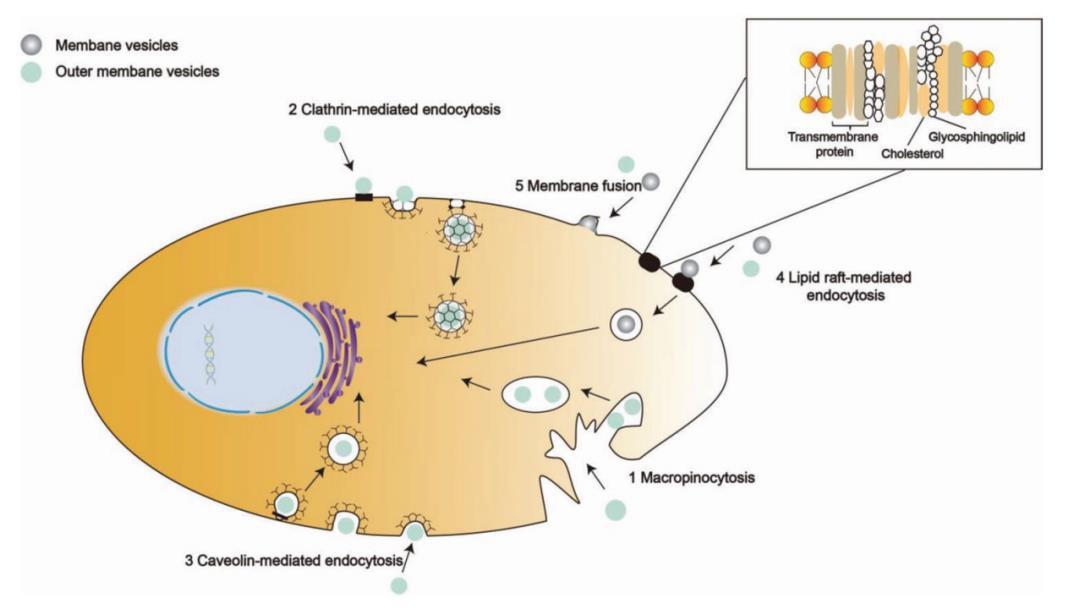Microorganism-derived Exosome Research and Applications
Microorganisms, ubiquitous in humans and other organisms, engage in intricate interactions with hosts, significantly impacting host health and disease processes. Microorganism-derived exosomes are nanoscale vesicles released by microorganisms into their surrounding environment, carrying bioactive molecules. These exosomes serve as messengers facilitating bidirectional communication between microorganisms and host cells. Creative Biolabs offers technical support for the study of microorganism-derived exosomes and is committed to exploring their potential in collaboration with clients.
 Fig.1 Schematic illustration of bacterial membrane vesicles entering the host cells.1,2
Fig.1 Schematic illustration of bacterial membrane vesicles entering the host cells.1,2
Why Study Microorganism-derived Exosomes?
-
Understanding Microbe-Host Interactions: Microorganism-derived exosomes contain bioactive molecules of microbial origin that mediate bidirectional communication between microorganisms and host cells. Investigating exosomes helps gain deeper insights into the mechanisms underlying microbe-host interactions, including processes such as infection, immune modulation, and symbiosis.
-
Disease Prevention and Treatment: Microorganism-derived exosomes can carry pathogen-related molecules such as toxins and antibiotic resistance factors, which may play crucial roles in disease occurrence and transmission. Researching these exosomes can lead to the identification of novel disease treatment targets and the development of therapeutic strategies targeting microorganism-derived exosomes, including anti-infective drugs and vaccine development.
-
Immunomodulation Studies: Microorganism-derived exosomes contain various immunomodulatory molecules that can influence host immune system activity. Investigating these exosomes aids in understanding how microorganisms modulate host immune responses, including mechanisms of immune suppression and activation. This knowledge is significant for developing immunomodulatory therapies and vaccines.
-
Biomarkers and Diagnostic Tools: Microorganism-derived exosomes carry specific microbial markers that can serve as disease biomarkers. Analyzing the molecular components of exosomes can lead to the development of new diagnostic tools for detecting microbial infections and assessing disease progression.
-
Drug Delivery Systems: Microorganism-derived exosomes possess natural nanoscale particle properties, making them suitable for use as drug delivery systems. They have the potential to enhance drug stability, bioavailability, and targeting, with applications in drug delivery and targeted therapy.
Introduction to Research Progress of Microorganism-derived Exosomes
Creative Biolabs provides an overview of research into microorganism-derived exosomes, encompassing the following areas:
Microorganism-derived Exosomes Extraction and Development Services at Creative Biolabs
Creative Biolabs offers professional services for the extraction and development of microorganism-derived exosomes, tailored to meet clients' research needs.
Bacteria-derived Exosome Isolation and Identification
In Vitro Functional Discovery of Bacteria-derived Exosomes
In Vivo Functional Discovery of Bacteria-derived Exosomes
With extensive experience and advanced technologies, we provide high-quality exosome samples and support related research and applications. If you are interested in our services or have any inquiries, please feel free to contact us. We look forward to collaborating with you to advance research on microorganism-derived exosomes.
References
-
Gan, Y.; et al. Bacterial membrane vesicles: physiological roles, infection immunology, and applications. Advanced Science. 2023, 25:e2301357.
-
under Open Access license CC BY 4.0, without modification.
For Research Use Only. Cannot be used by patients.
Related Services:

 Fig.1 Schematic illustration of bacterial membrane vesicles entering the host cells.1,2
Fig.1 Schematic illustration of bacterial membrane vesicles entering the host cells.1,2









